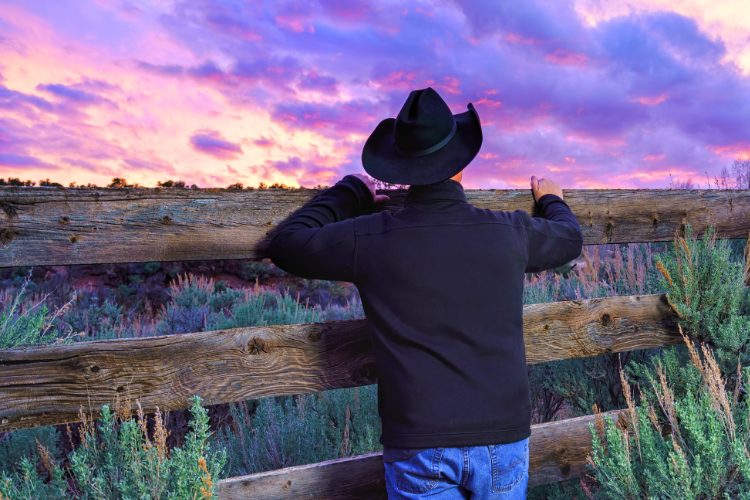By Ryan Goodman and edited by Renata Hill, originally published in Pride in Agriculture
New research reveals that LGBTQ+ farmers and ranchers face significantly higher rates of mental health challenges compared to the general population
LGBTQ+ people involved in farming and ranching are three times more likely to experience depression and suicidal intent and two and a half times more likely to experience anxiety than the general population. These findings from the University of Illinois Urbana-Champaign (U of I) underscore the urgent need for targeted support and resources to address the unique stressors faced by Trans people and neighbors living on the Gender and Sexual Orientation spectrums.
“For several years, I’ve done work around farm stress and mental health among farmers in general," said Courtney Cuthbertson (they/them), an assistant professor and Illinois extension specialist in the College of Agricultural, Consumer and Environmental Sciences at U of I. "We’ve found people who work in agriculture have adverse mental health compared to those who work in other areas. Similarly, there are findings that Queer folks have worse mental health than their straight and cisgender peers," they said.
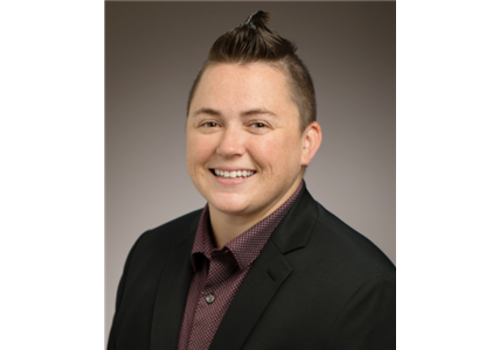
Diving into the data
At least 23,000 Queer people are involved in U.S. farming, but Cuthbertson believes the actual number is likely higher. The U of I research team surveyed LGBTQ+ farmers and ranchers across the U.S., asking about sexual and gender identity, stress, anxiety, depression, resilient coping and suicide risk as well as the agricultural commodities with which they worked.
Of the 148 responses received from 36 states, the data showed:
- about 72% of respondents experienced symptoms of mild to severe depression
- 70% had mild to severe anxiety
- 52% were at significant risk of suicide.
“The percentages ... were in alignment with, if not higher than, general farming populations, which would indicate a double burden for LGBTQ+ folks in farming,” Cuthbertson said.
Interestingly, the researched revealed that Queer ag workers generally did not have the same suicide risk as their urban counterparts. "That leads me to wonder whether working in agriculture could have a protective effect for LGBTQ+ people regarding suicide risk,” Cuthbertson said.
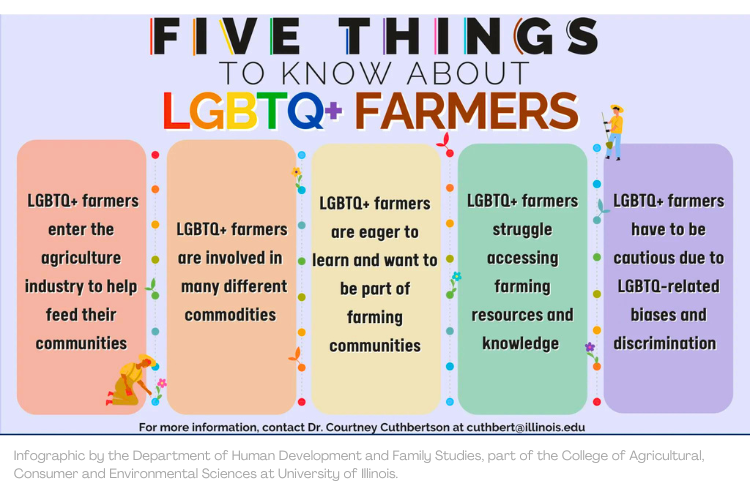
Gender differences in mental health outcomes
When the subgroups were analyzed individually, the researchers learned that a greater proportion of people identifying as men experienced anxiety, depression and suicide risk compared to non-men, a pattern mirrored in the farming community at large. Cuthbertson said this may be due to norms around masculinity in agriculture.
Further, gay respondents and those working in field crops and beef production were more likely to have probable depression, though ranchers were least likely to have received that diagnosis from a medical professional. Generally, more respondents appeared to have undiagnosed depressive or anxious symptoms. Cuthbertson said this information aligned with their research on farmers and ranchers in general.
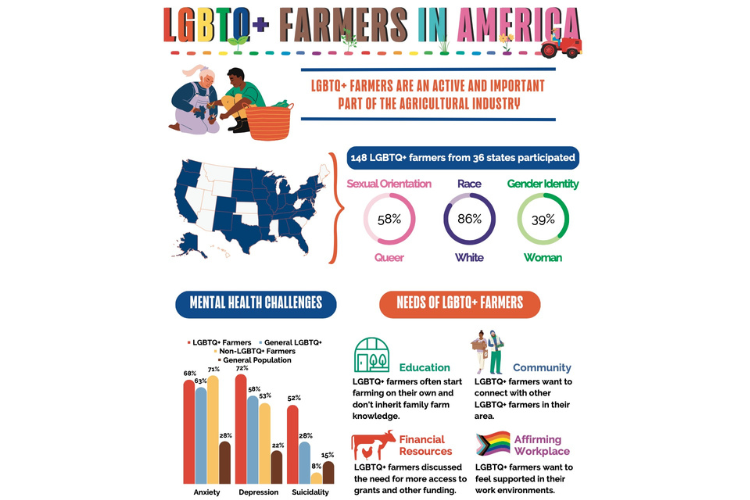
Challenges in accessing mental health care
Cuthbertson talked about the intense pressure small-family farmers and ranchers feel to work every day. Taking time off even for a brief appointment with a mental health professional equals not producing and spending money on non-ag costs.
Ag work employees "may not have supervisors or managers who are willing to let them take a break to go to therapy. They may also not have health benefits that would include mental health coverage,” Cuthbertson said.
Plus, there's the ever-present stigma for almost everyone living rural. "... In a lot of agricultural communities, ... someone might not want their vehicle to be seen in front of the therapist’s office," said Cutherbertson.
However, Queer people carry the added need to preserve and nurture their hard-won identities. Will a rural provider know to use preferred pronouns, be welcoming and respectful? Many rural and frontier communities are mental health deserts and the providers who do work in these areas may not have adequate cultural competency training. According to Cuthbertson this sense of validation is not a concern for straight and cisgender people.
The true meaning of sustainable agriculture
Cuthbertson stressed that the contributions of LGBTQ+ people in farming and ranching should not be discounted or dismissed. “There have been so many conversations about making agriculture a more sustainable industry to ensure future food security,” they said. “I’ve made the argument that agriculture can’t be sustainable unless it’s sustainable for the people working in it, which means being attentive to mental and physical health as well as making the industry as inclusive as possible for any and all who want to be part of it.”
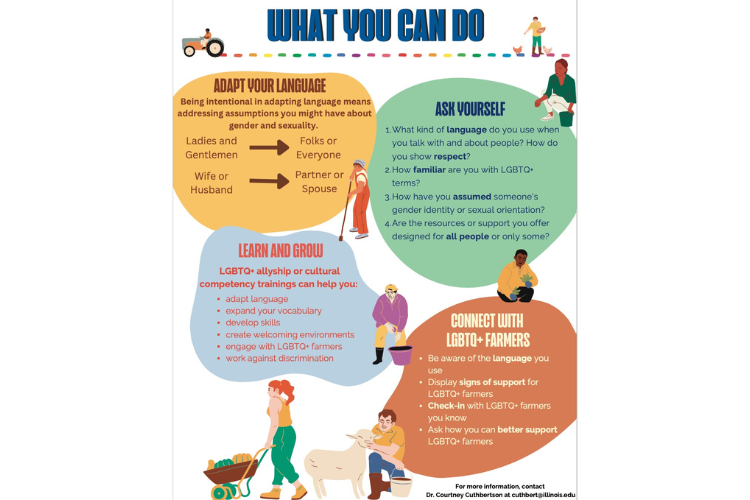
"I was motivated to do this study because there’s very little research that looks at the crossover of LGBTQ+ people who work in agriculture,” said Cuthbertson.
Recommendations and resources for supporting LGBTQ+ farmers and ranchers
The U of I research team created several fact sheets based on the research and have some advice for community members who want to support LGBTQ+ ag workers. The advice includes:
- using inclusive language and being conscious of expansive gender and relationship statuses
- engaging in allyship or cultural competency trainings
- offering equitable support.
“It’s important to look at what’s happening in the environment for LGBTQ+ folks, rather than assuming the problem lies with them. When we see things like depression, anxiety or suicide, these are signs that something is distressing,” Cuthbertson said. “Let’s identify root causes and see what we can do about it, rather than problematizing a marginalized group.”
Ryan Goodman is a gay man in agriculture and the founder of Pride in Agriculture, a nonprofit organization advocating for a more inclusive, supportive and sustainable agricultural community. He also moderates the Pride in Agriculture Facebook group and believes that if you want to go far, go together.
Here are some local and national resources for Queer ag workers struggling to achieve mental health in Colorado:

